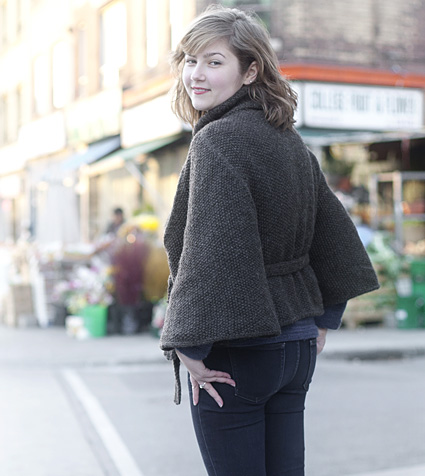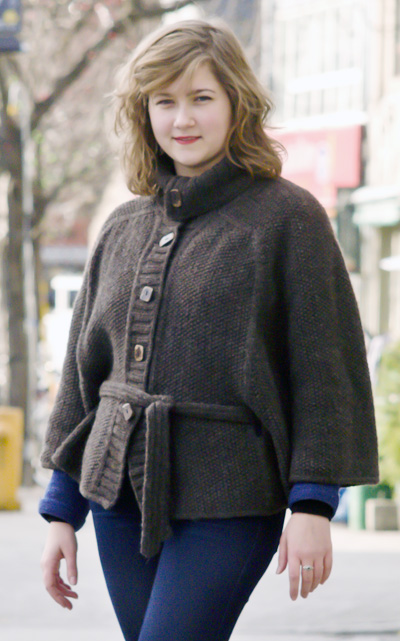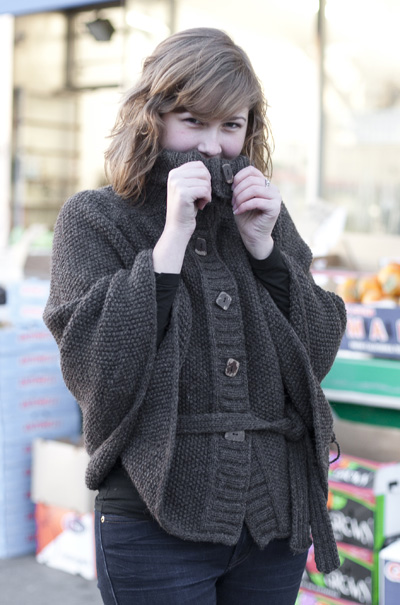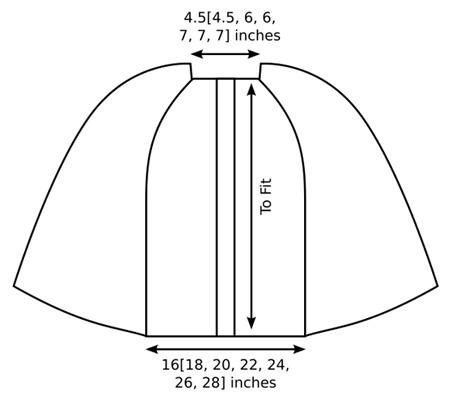

|
|
|
 |
This cape is a perfect addition to any winter wardrobe. It can be worn over any number of layers to create the perfectly cozy extra amount of warmth. It is knit all in one piece, but the addition of a belt creates the illusion of sleeves and a waist. The construction starts from the shoulders and grows from there, which means that it is very easily customized for size and fit. |
|
|
|
|
SIZE |
|
FINISHED MEASUREMENTS |
|
MATERIALS Notions |
|
GAUGE |
| 14 sts/28 rows = 4" in Seed Stitch using US #8/5mm needle, after blocking |
|
PATTERN NOTES |
|
The length of this garment is based on the back waist length of the wearer. To take this measurement, use a tape measure to measure straight down the center of the back, from the prominent bone at the base of the neck to the waistline. It is useful to tie a piece of string or elastic around the wearer's waist before measuring, to pinpoint waist level. If you are measuring yourself, it may be helpful to have a friend help you. Instructions for the Cable Cast On can be found here. Instructions for the Knitted Cast On method (“knitting on”) can be found here. Instructions for the Backward Loop Cast
On can be found here. Seed Stitch (Worked over an even number of sts): |
|
DIRECTIONS 
Using larger (US #8/5mm) circular needle, CO 14[16, 18, 18, 20, 20, 20] sts. Row 1 [WS]: P all sts. Row 2 [RS]: Sl 1 knitwise, k2, work in Seed Stitch to last 3 sts, k3. Row 3 [WS]: Sl 1 purlwise, p2, work in Seed Stitch to last 3 sts, p3. Repeat Rows 2-3 9[10, 11, 11, 12, 12, 12] times more. Break yarn and place all sts on hold on smaller circular needle. CAPE BODY Using larger circular needle, CO 4[4, 6, 6, 8, 8, 8] sts for right front neck; *beginning at CO edge, pick up and k 16[18, 20, 20, 22, 22, 22] sts along side edge of one shoulder panel; k first 2 held sts of panel, place marker, k1, work in Seed Stitch to last 3 sts of panel, k1, place marker, k2; pick up and k 16[18, 20, 20, 22, 22, 22] sts along remaining side edge of shoulder panel;* continuing from sts just worked, CO 16[16, 20, 20, 24, 24, 24] sts for back neck; repeat from * to * for remaining shoulder panel; CO 4[4, 6, 6, 8, 8, 8] sts for left front neck. 116[128, 148, 148, 168, 168, 168] sts: 22[24, 28, 28, 32, 32, 32] sts for each front, 10[12, 14, 14, 16, 16, 16] sts for each side panel, 52[56, 64, 64, 72, 72, 72] sts for back. Upper Body Increase Sequence: The back and fronts of the garment have now been increased to their full width. From this point on, only the side panels will be increased. The rest of the cape will be worked to fit, based on the wearer's back waist length (see Pattern Notes). It is a good idea to periodically transfer all sts to waste yarn or st holders and try on the garment to check the length, ensuring that front and back edges are even. In directions that follow, measure length along center back, straight down from back neck edge. Note that length when worn will be deeper than length at center back, as shoulder panels will add approx. 1.75[2, 2.25, 2.25, 2.5, 2.5, 2.5] inches to the length of the garment. Repeat Rows 3 and 4 of upper body increase sequence until work measures 8.25[8.5, 8.75, 8.75, 9, 9, 9] inches less than back waist length, ending with Row 4. Lower Body Increase Sequence: BELT OPENINGS Left Front: Left Side Panel: Back: Right Side Panel: Right Front: Rejoin Panels: Continue working lower body increase sequence until work measures 4[4.5, 5, 5.5, 6, 6, 6] inches from lower edge of belt openings or desired length, ending with a WS row. Try on cape to ensure best length. I-cord Bind Off:
 Using smaller circular needle, k 3 sts of I-cord; continuing from these sts and with RS facing, pick up and k 2 sts for every 3 rows along right front edge of cape. Count sts. When working first row, increase or decrease 1 or 2 sts if necessary to obtain a multiple of 4 sts. Row 1 [WS]: Sl 1 purlwise, [p2, k2] to last 3 sts, p3. Buttonhole Row 1 [RS]: Work in pattern to marker, remove marker,
*BO 2 sts, work 17 sts in pattern (18 sts on right needle after
bound off sts); repeat from * twice more, BO 2 sts, work in pattern
to end. Work 6 more rows in pattern. Loosely BO all sts in pattern. BUTTON BAND COLLAR Important: Because collar will be folded back, RS of collar is worked with WS of cape facing. Collar is worked with integral I-cord edging. Row 1 [RS]: Sl 3 purlwise with yarn held to back of work, bring
yarn between needles to front of work, [p2, k2] to last 5 sts,
p2, k3. Buttonhole Row 1 [RS]: Work in pattern to last 7 sts, BO 2 sts,
work in pattern to end. Continue in pattern until work measures 3 inches from picked-up
edge. Repeat Buttonhole Rows 1 and 2. Continue in pattern until work
measures 8 inches from picked-up edge, ending with a RS row.
BELT |
|
FINISHING Insert belt through belt openings as shown in photos. |

|
| ABOUT THE DESIGNER |
|
|
|
Pattern & images © 2011 Natalie Selles. Contact Natalie |